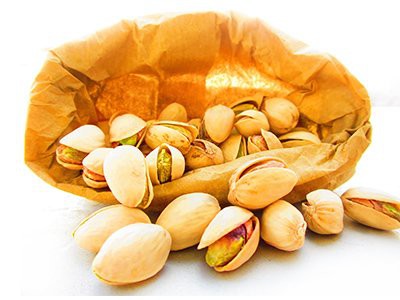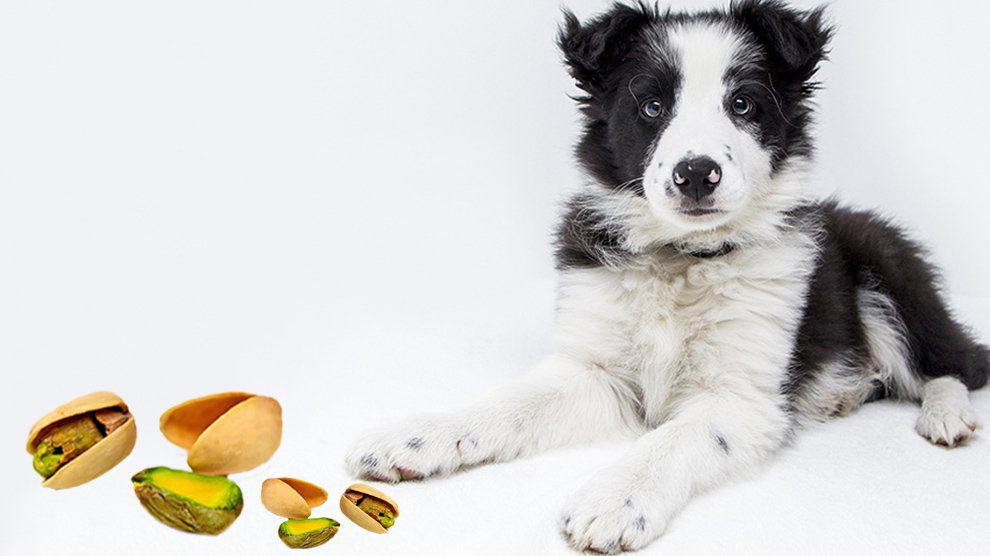- Can Dogs Eat Pistachios? What Is Pistachio Toxicity?
- Symptoms Of Pistachio Toxicity In Dogs
- Symptoms Of Aflatoxin Poisoning In Dogs
- Symptoms Of Pancreatitis In Dogs
- Various Reasons For Pistachios Toxicity In Dogs
- Diagnosis Of Pistachio Toxicity In Dogs
- Treatment Procedure For Pistachio Toxicity In Dogs
- Can A Pistachio Hurt Or Kill My Dog?
- Nutritional Information About Pistachios
- Benefits Of Feeding Pistachios To Dogs
- Can Dogs Eat Pistachio Shells?
- How To Prepare Or Serve Pistachios For Dogs?
Dog Pregnancy Calculator And Timeline
Can Dogs Eat Pistachios?
No. Pistachios have high-fat content and it can lead to stomach upset in your dogs. More than that, pancreatitis can set in if your dog eats pistachios on a frequent basis.
Some might recommend pistachios without a shell. But still, it is not a good idea to feed your dog with these type of nuts.
Can Dogs Eat Pistachios? What Is Pistachio Toxicity?
Keep in mind that properly processed or prepared pistachios nuts are not toxic as such. The dog’s digestive system does not support the proteins found in nuts.
Large or excessive intake can cause pancreatitis, obesity, and gastrointestinal distress. Pistachios may also support Aspergillus mold. Aflatoxin found in molds can be toxic to dogs.
Symptoms Of Pistachio Toxicity In Dogs
- Vomiting
- Greasy appearing stools
- Diarrhea
- Dehydration
- Orange color urine
Symptoms Of Pancreatitis In Dogs
- Weight loss
- Weakness
- Vomiting
- Abdomen swelling
- Severe abdominal pain
- Colored urine
- Lethargy or lack of energy to perform regular activities
- Lack of appetite
- Heart arrhythmias
- Fever
- Difficulty in breathing
- Diarrhea
- Depression
- Dehydration or water loss

Points to keep in mind
Aflatoxin exposure is not only restricted to pistachios. Aspergillus mold is present in several plant species such as wheat, hay, and corn. In several instances, animals pass on this mold via their byproducts like eggs or milk.
There are no species of animals that are free from aflatoxin exposure. In spite of strict regulations in place, aflatoxin toxicity is a never-ending problem.
Various Reasons For Pistachios Toxicity In Dogs
Some of the secondary risks
- Pancreatitis is a highly painful disorder which can occur due to high-fat content in the nuts.
- Since most of the pistachios sold in the market are with shells, when consumed with their shells, the dogs can suffer from choking. The sharp or jagged pieces of the pistachios can rupture the gastrointestinal tract. It can also rupture the esophagus.
- Bladder stones are a possibility because of the rich phosphorous content in the nuts.
- Aflatoxin exposure is mainly due to mold. These molds are usually found in almonds, brazil nuts, walnuts, and pistachios.
- The salt levels in pistachios can increase the water retention capacity of the dogs. It can cause kidney troubles. Dogs suffering from heart conditions should avoid eating pistachios at any cost.
Diagnosis Of Pistachio Toxicity In Dogs
The vet might usually start by checking
- History of the pet
- Foods consumed recently
- Blood count, complete profile, and physical examination
- Aflatoxin exposure via vomitus, stools, and urine test
- Depending on the severity of the case, the vet may call for the abdominal ultrasound. if needed, he will order a scan test or x-ray of the dog’s throat or chest area
Treatment Procedure For Pistachio Toxicity In Dogs
The normal treatment steps are
Prescribing IV fluids in case of dehydration
- Vitamin K treatments and hepatoprotectants are followed to handle aflatoxin toxicity.
In some cases, vets will stop feeding by mouth. Intravenous feeding giving the dog more time to recover from pancreatitis will be recommended. - Pancreatic supplements can also be given to relieve the from abdominal pain or trouble.
- Quick and speedy recovery depends on the severity of the condition. Be patient and keep up with the vet appointment.
Thus, it is better to feed your pets with pet-friendly food items.
Can A Pistachio Hurt Or Kill My Dog?
Walnut shells are also known to contain the same effect. Similar to walnuts, pistachios does not contain that much amount of toxicity.
Eating a pistachio occasionally will not have much impact on a strong and sturdy dog.
Eating a large amount can cause pancreatitis. Enzymes freed from the pancreas can easily damage the other parts causing death in some cases.
To be on a safe side, avoid feeding pistachios to your dog at all.
Nutritional Information About Pistachios
One gram of pistachio contains
- Kcal – 55.7
- Carbohydrates – 2.79 grams
- Proteins – 2.06 grams
- Fat – 4.44 grams
- Dietary fiber – 1.03 grams
Pistachios contain monosaturated fatty acids. This fatty acid is also considered for reducing bad cholesterol levels.
Other than these fatty acids, pistachios contain a lot of nutrients including
Phosphorus
Phosphorus like calcium is also essential for integrity, density, and bone structure. They are important for cognitive functioning.
Selenium
Selenium is another antioxidant that can provide coactive effects such as vitamin A, vitamin E, copper, and zinc.
Zinc
Zinc increases the strength of the immune system. This will increase the immune boosting and it enhances the antioxidant.
Manganese
Manganese makes sure that the nervous system is vital in the production related to sex hormones, bones, blood clotting factors, and connective tissues.
Magnesium
The main functions of magnesium include
- Maintaining balance
- Regulate the blood levels of calcium, sodium, and potassium
- Help reduce muscle spasm
Iron
Iron is much needed in the form of hemoglobin, a vital protein that carries oxygen to all the tissues. It removes carbon dioxide.
Copper
Copper facilitates in the optimal functioning and enhancement of cellular functions.
Calcium
Calcium supports stronger and healthier bones and also aids in muscle contraction.
Vitamin E
Vitamin E brings shine to your dog’s coat and skin. It boosts the immune system and its antioxidant functions work well with beta-carotene and vitamin A.
Vitamin B complex
Pistachios contain a rich trove of riboflavin, thiamin, pyridoxine, pantothenic acid, and niacin.
This nutrient plays a pivotal role in the functioning of macronutrient molecules.
Beta-carotene
Beta-carotene enhances your dog’s skin and coat. This chemical slows down cognitive failure. For senior dogs, beta-carotene is very useful.
Benefits Of Feeding Pistachios To Dogs
The pistachio nut consists of nutrients such as vitamin C, potassium, calcium, omega-3 fatty acids. Pistachios contain around less than 7% of the daily percentage of saturated fat per serving.
There are very less scientific experiments to prove whether pistachios are really beneficial as a supplement or not.
Can Dogs Eat Pistachio Shells?
The pistachio remains non-toxic to dogs but some of the chemicals present in pistachio can cause trouble. As with all treats, there is always this danger of choking hazard.
A dog that consumes unshelled pistachios can damage their digestive tract. The shells are very hard to pass during elimination. This, in turn, can cause discomfort to soft tissues.
Pistachio nuts contain, urushiol, a chemical that can cause skin rashes and respiratory problems. This type of skin rash is called contact dermatitis. Dogs too can suffer from similar sort of reactions, around their mouths and on their faces.
The shell of this nut safeguards it from mold infection.
How To Prepare Or Serve Pistachios For Dogs?
Serve pistachios only after removing the shells. You can buy shelled pistachios or you can remove the shells at home. They can be served as occasional treats or mixed into their regular meal.
Pistachios should never become a major part of your dog’s daily diet.


















